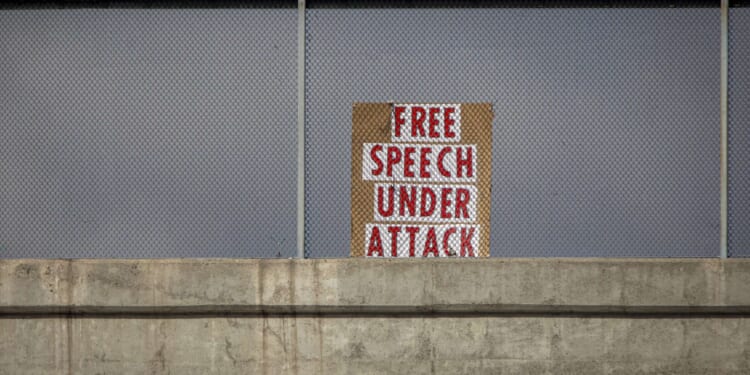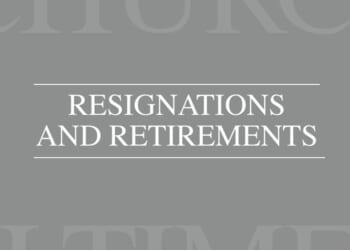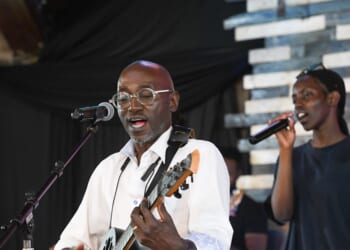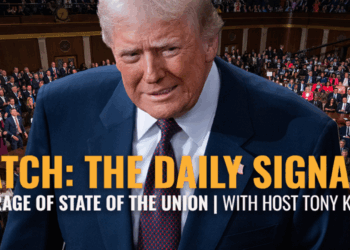Cancellations, sometimes violent protests, behind-the-scenes censorship, and overt government threats to muzzle the media. Free speech is doing better in the U.S. than elsewhere in the world, but that doesn’t mean it’s doing well. It’s besieged by hostile politician and a shifting culture that is eroding the foundations of tolerance for dissent and an open marketplace of ideas. That has Americans worried, though even as they fret over the future of free speech a significant minority contribute to the problem.
You are reading The Rattler from J.D. Tuccille and Reason. Get more of J.D.’s commentary on government overreach and threats to everyday liberty.
Reporting the results of the quarterly National Speech Index (NSI) survey, the Foundation for Individual Rights and Expression (FIRE) noted that “a staggering 74% of Americans in the October edition of the NSI responded that things are headed in the wrong direction for free speech, compared to only 26% who believe things are headed in the right direction. This represents a 10-point jump since the previous July survey.”
“Notably, drops in confidence across all political parties contributed to the record-levels of pessimism,” FIRE added. “From July of this year, Democrats who think things are heading in the right direction fell from 17% to 11%, Independents fell from 31% to 19%, and Republicans fell from 69% to 55%.”
Unsurprisingly in these partisan times, Democrats and Republicans swapped roles as optimists and pessimists in January as the Trump administration took office. Democrats slid from 50 percent belief before the election that the country was on the right track when it came to people’s ability to express their views to 17 percent saying so. Republicans went from 24 percent confidence that the country was on the right track to 66 percent confidence. Independents also became more optimistic, though by less than Republicans. The public’s faith in the health of free expression, however, now appears to be on a universal decline.
Importantly, 59 percent of those surveyed by FIRE believed “the right to freedom of speech in America today” is either “not at all secure” (22 percent) or “not very secure” (37 percent).
The latest survey was administered after the assassination of conservative activist Charlie Kirk on September 10. That incident featured widespread public gloating over Kirk’s murder by those who disagreed with him, as well as firings and other forms of retaliation against the loudmouths—including, unfortunately, U.S. Attorney General Pam Bondi’s unconstitutional threat: “We will absolutely target you, go after you, if you are targeting anyone with hate speech.” It wasn’t exactly a shining moment for the world’s bastion of protection for free expression as government suppression of even innocuous speech becomes more common elsewhere, including the supposedly liberal democracies of Europe.
“In the last three months, America watched as Charlie Kirk was murdered for simply debating on a college campus, followed immediately by a wave of censorship of those who opposed his views,” remarked FIRE Research Fellow and Polling Manager Nathan Honeycutt. “It’s no surprise that a record number of Americans of all parties now think that it’s a dire time for free speech in America.”
As you would expect when a culture starts to shift in ways that erode the foundations of basic liberties, the rot comes from within. While 56 percent of those surveyed completely disagreed with the statement: “The First Amendment goes too far in the rights it guarantees,” 35 percent say it at least “somewhat” describes their sentiments. Another 8 percent say it “slightly” reflects their thoughts. You’d hope for a little more than bare majority support for a core protection for freedom.
Worse, 59 percent of respondents at least somewhat agreed that “words can be violence.” Characterizing speech one group dislikes as violence is often used to justify deplatforming, cancellation, and legal penalties. It blurs the distinction between ideas and action, potentially spurring real violence in response to disagreement—such as Kirk’s assassination. In September, the Buckley Institute’s National Undergraduate Study found that 39 percent of college students agreed “physical violence can be justified to prevent a person from using hate speech or making racially charged comments.”
Also, for people uncomfortable with the direction of free speech in this country, many Americans seem willing to see people tossed from their jobs for controversial comments that are politically charged but shielded from legal action by constitutional protections. According to FIRE:
- 45 percent say a professor who posted “It’s O.K. to punch a Nazi” should probably or definitely be fired from their job.
- 37 percent say a professor who posted “These fascist Bible-thumpers want to drag us back to the Dark Ages” should probably or definitely be fired from their job.
- 24 percent say a professor who posted “Our colleges and universities are progressive indoctrination centers” should probably or definitely be fired from their job.
- 14 percent say that a professor who posted “We are going to make America great again” should probably or definitely be fired from their job.
The good news is that these are minority positions. The bad news is that the first one, at least, isn’t far from being a majority. And, while it’s natural that employers might want to discourage employees from saying things that tarnish the brand, these questions were all asked in the context of college professors who play with (frequently half-baked) ideas. Putting their jobs on the line won’t improve the climate for intellectual inquiry—especially when firings can result from political pressure.
Speaking of political pressure: The Biden administration infamously leaned on social media companies to muzzle dissent over pandemic policy and embarrassing news revelations. Officials used the implicit threat of legal and regulatory action to get private companies to suppress speech protected by the First Amendment. In the FIRE survey, 53 percent of respondents were very or extremely concerned about government “pressuring social media companies to suppress the posting of certain viewpoints.”
Since then, not only has Bondi hinted at action against “hate speech,” but the Trump administration has repeatedly threatened to pull the broadcast licenses of television companies that anger the president and his cronies. He did so again just days ago after an ABC reporter asked about the Epstein files. Fifty-two percent of FIRE respondents were very or extremely concerned about the federal government “pressuring private broadcast companies to remove certain viewpoints from the airwaves.”
Free speech still enjoys better protection in the United States than anywhere else in the world. But the American people are justifiably concerned that the rights protected by the First Amendment are under threat from both government and some of their fellow countrymen.

















